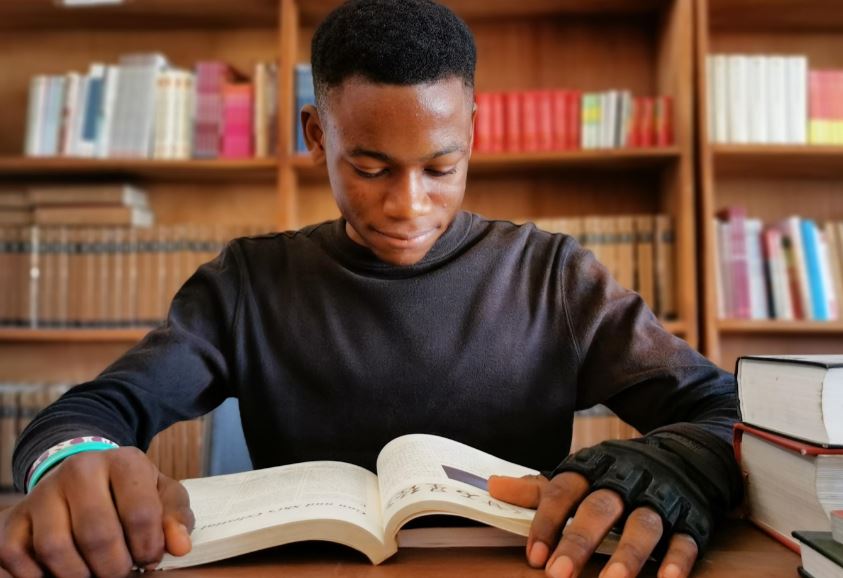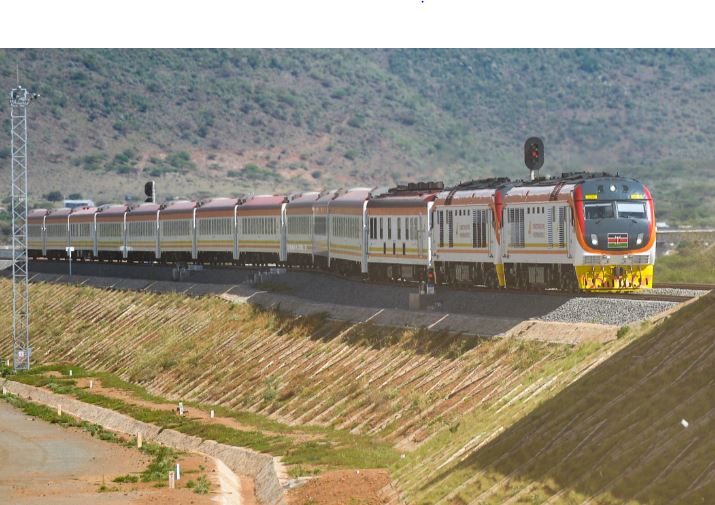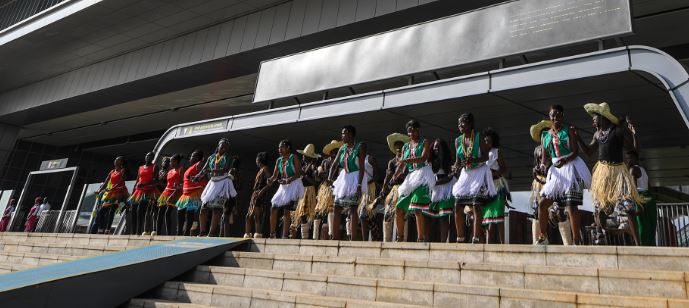 Samuel Miracle studies at a library in the Confucius
Institute at the Nnamdi Azikwe University in Anambra State, Nigeria,
Dec. 16, 2019. [Xinhua/Zhen Jianle]
Samuel Miracle studies at a library in the Confucius
Institute at the Nnamdi Azikwe University in Anambra State, Nigeria,
Dec. 16, 2019. [Xinhua/Zhen Jianle]

The year 2020 has been quite unusual for Hussein Mohammed, a young Ethiopian man, who experienced the COVID-19 pandemic both in China's Wuhan, and in Addis Ababa, capital of the most populous East African nation, Ethiopia.
In the face of adversity, Mohammed witnessed how the China-Africa partnership has prevailed.
"I have seen how the Chinese government has done a wonderful job in securing the lives of both its citizens and those of international students by declaring a state of emergency, prohibiting mass gatherings, issuing a mask mandate and lockdown orders," Mohammed said, recalling his days in Wuhan.
After receiving his master's degree in biological engineering at the Huazhong University of Science and Technology in China, the 25-year-old returned to Ethiopia in June and worked as a research and development engineer at BGI, a COVID-19 test kit factory built by China.
"As an Ethiopian, I am proud to work in a globally connected company like BGI," he said. "I'm contributing my share to the community."t
Mohammed is just one of the millions of beneficiaries of thriving cooperation within the framework of the Forum on China-Africa Cooperation (FOCAC).
As the forum marks its 20th anniversary, its results have been seen across Africa. People dance to celebrate the launch of the
Nairobi-Naivasha Standard Gauge Railway (SGR) cargo service in Nairobi,
Kenya, on Dec. 17, 2019. [Xinhua/Li Yan]
People dance to celebrate the launch of the
Nairobi-Naivasha Standard Gauge Railway (SGR) cargo service in Nairobi,
Kenya, on Dec. 17, 2019. [Xinhua/Li Yan]
BOOSTING AFRICA's INDUSTRIALIZATION
From West Africa's Nigeria to East Africa's Ethiopia, China has built more than 6,000 km of railways and roads, respectively, as well as nearly 20 ports and more than 80 power plants, which have promoted African industrialization and enhanced the continent's development capacity.
"Looking at what Africa has become in the past 20 years with FOCAC, we can say that it has been a game-changer. The whole African infrastructure has been massively changed," said Charles Onanaiju, director of Nigeria's Center for China Studies.
The BGI factory, located inside the Bole Lemi industrial park on the outskirts of Addis Ababa, will not only boost the country's capacity to fight COVID-19, but also improve its position as a manufacturing hub in Africa.
"Once the plant reaches peak capacity of 10 million kits' production annually, it will not only be serving Ethiopia, but will also be able to serve other countries in the East African region and even the wider African continent," said Ethiopian Minister of Health Lia Tadesse.
At the Beijing summit of the FOCAC held in 2018, China announced industrialization as one of the eight initiatives that will help Africa fast-track its economic transformation.
Private enterprises in China have also been delivering on the country's commitment to help industrialize Africa through the FOCAC framework.
One such enterprise is ENGO, which started with the assembling of feature phones and smart phones and later planned to manufacture thermometers due to the pandemic.
The firm exported its first batch of phones to Morocco in May, with the North African country ordering 16,000 phones every two or three weeks.
David Beecham Okwere, secretary of chief executive director of the electronics firm, told Xinhua that besides the domestic market, the company also started exporting to regional markets via dealerships.
Earlier this month, Ethiopian Prime Minister Abiy Ahmed inaugurated an industrial park built by China at a cost of 60 million U.S. dollars.
Ahmed said the Bahir Dar Industrial Park, located 552 km north of Addis Ababa, will facilitate the country's knowledge transfer and boost its science capacity in addition to creating more jobs.
"Ethiopia has so far commissioned 13 industrial parks which have been crucial in the country's efforts to achieve prosperity and boost economic development," he said.
Moreover, China has been serving as a strong driving force for Africa's sustained economic growth. It has been Africa's largest trading partner for 11 years in a row, and bilateral trade exceeded 200 billion dollars in 2019.
China's stock of direct investment in Africa has reached 110
billion dollars, and over 3,700 Chinese enterprises have invested and
started businesses in various parts of Africa. A train arrives at the Maai Mahiu Station of the Nairobi-Naivasha Standard Gauge Railway (SGR) in Kenya, Oct. 16, 2019. [Xinhua/Li Yan]
A train arrives at the Maai Mahiu Station of the Nairobi-Naivasha Standard Gauge Railway (SGR) in Kenya, Oct. 16, 2019. [Xinhua/Li Yan]
CAPACITY BUILDING
Thanks to the Juncao technology developed by China, Emmanuel Ahimana, a father of four in Rwanda, managed to survive the economic crisis brought on by the COVID-19 pandemic.
"Many people in Rwanda are not aware that mushroom farming is a profitable business that can help fight poverty," said Ahimana, who started his mushroom-growing business in 2016. Juncao, which literally means "mushroom" and "grass," refers to a technology using grass to grow mushrooms.
The former mechanical technician of a sugar factory learned Juncao technology from experts with China's Fujian Agriculture and Forestry University.
"I feed my family, pay school fees for my children ... the income I get from this business helps me grow my company," he said.
Ahimana is not alone in getting benefits from Chinese technology and starting a new life.
Elizabeth Wanjala, a young Kenyan woman, is among the pioneering group of female drivers of the Standard Gauge Railway (SGR) passenger train after graduating from university.
"I joined the company in early 2017 and went to China for a three-month training program that focused mainly on SGR locomotives. When I returned to the country, we continued with on-the-job training," Wanjala said.
Li Jiuping, general manager of SGR operator Afristar, said that as part of the Belt and Road Initiative, SGR is the "road of friendship" and "road of prosperity and development" for win-win cooperation between China and Kenya.
Vocational training is key to economic growth in Africa, said Yang Guanchen, a vocational projects development manager at AVIC International Holding Corporation, a major infrastructure contractor in Kenya.
China has shared with African countries its experiences of "lifting its people out of poverty, building its industrial prowess, using its resources in a very efficient way, and developing its technology," which the West has never done in Africa, said Costantinos Bt. Costantinos, a professor of public policy at Addis Ababa University in Ethiopia.
FRIEND IN NEED
Amid the COVID-19 pandemic which has claimed more than 38,000 lives in Africa, China has been lending a helping hand.
China has sent much-needed supplies to more than 50 African nations, dispatched medical experts to over 10 African nations, and shared its anti-epidemic experience with medical workers across the continent via video conferences.
China and Africa are ready to uphold the spirit of solidarity and cooperation, jointly cope with various risks and challenges, and let their cooperation shine as an example of multilateralism and mutual benefits, Chinese President Xi Jinping and Senegalese President Macky Sall said Monday in a joint congratulatory message to mark FOCAC's 20th anniversary.
Chen Tao, an infectious disease doctor at Tongji Hospital in central China's Hubei Province, set foot on the African continent in September with nine colleagues to help fighting COVID-19 in Lesotho and Angola.
"When our African brothers are in need, we come to help."
The loosening of regulations and lax social distancing and mask habits, together with inadequate testing, tracing and treatment capabilities, pose great risks for African countries, said Chen, who compared notes about treatment with more than 200 Angolan medical staff.
According to a communique issued by the AU recently, China has ensured the supply of 30 million testing kits, 10,000 ventilators and 80 million masks each month for Africa, a significant contribution to Africa's response to the pandemic.
China's plan to start construction of the Africa CDC headquarters this year ahead of schedule is "once again a testimony to the renewed commitment of African and Chinese leaders for strong partnership and friendship between Africa and China in public health," Kwesi Quartey, deputy chairperson of the AU Commission, said at a virtual meeting.
Chinese enterprises and civil organizations have also been actively assisting the continent's fight against the virus. Jack Ma Foundation and Alibaba Foundation have donated three batches of essential medical supplies, including 10.6 million masks and 800 ventilators, to Africa.
Solomon Ayele, a nurse at an Ethiopian hospital, said that the medical supplies and guidelines for diagnosis, treatment and control of the disease will greatly contribute to Africa's battle against COVID-19.
"FOCAC is consolidating relations. Relations between China and Africa are growing stronger in different areas," said Professor Mamadou Fall, executive director of the Confucius Institute at Senegal's Cheikh Anta Diop University, adding that the pandemic was a clear testimony of the close relationship. (Xinhua correspondents Wang Shoubao in Addis Ababa, Lv Tianran in Kigali, Bai Lin, Wang Hongjiang and Wang Xiaopeng in Nairobi, Xing Jianqiao in Dakar, Wu Changwei in Windhoek, Zhang Gaiping in Kampala, Yin Xiaosheng in Hangzhou, Zhang Yujie in Changsha, Yang Jun and Xia Ke in Beijing, and Zhao Yupeng in Lusaka contributed to the story.)




No comments :
Post a Comment